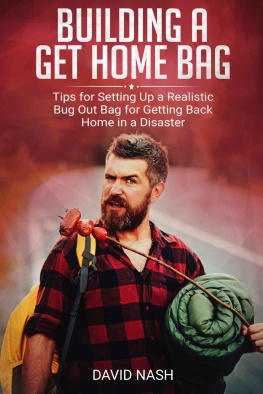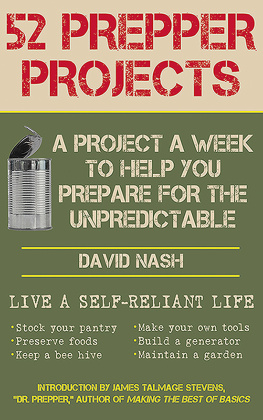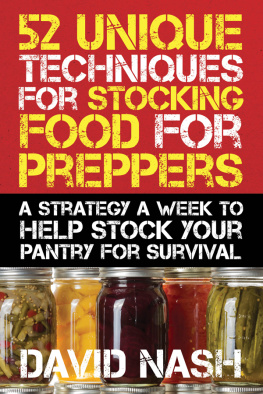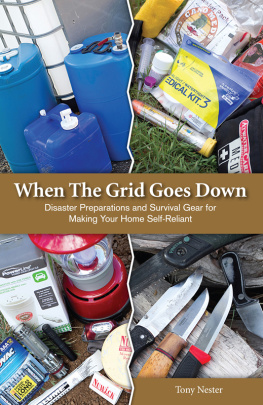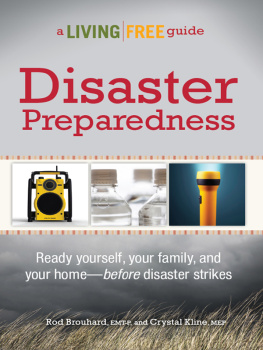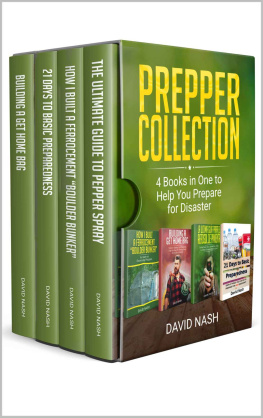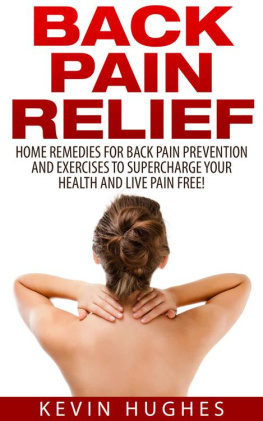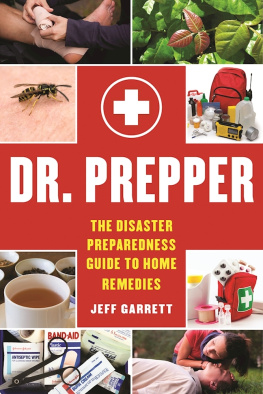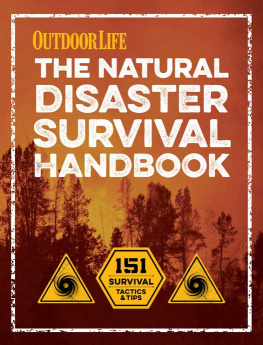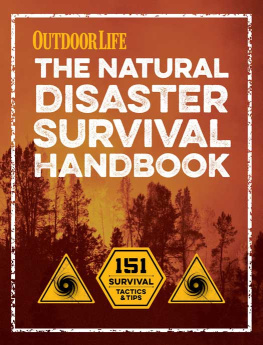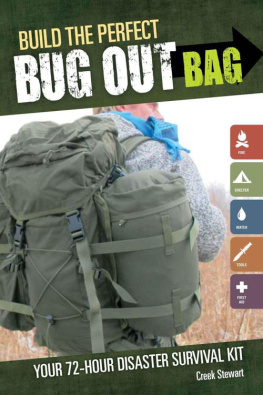Building a Get Home Bag
Tips for Setting Up a Realistic Bug Out Bag for Getting Back Home in a Disaster
David Nash
Copyright 2019 by David Nash
All rights reserved.
No part of this book may be reproduced in any form or by any electronic or mechanical means, including information storage and retrieval systems, without written permission from the author, except for the use of brief quotations in a book review.
Contents
Preface
Since you are reading a book on self-reliance, I am assuming you want to know more about how to take care of yourself in disaster situations
I would like to suggest you take a moment and visit my website and YouTube channel for thousands of hours of free content related to basic preparedness concepts
Daves Homestead Website
https://www.tngun.com
Daves Homestead YouTube Channel
https://www.youtube.com/tngun
Shepherd Publishing
https://www.shepherdpublish.com
A bugout bag/72 hour kit is one of the very first projects a new prepper makes as they explore the idea of becoming more self-reliant. A quick search for the term bug out bag on Amazon kindle shows more than 9 pages of books. Why should you read this one?
I can only explain why by telling you my own personal ideas on the subject. With very few exceptions, the experts in prepping are all just selling you their own ideas and personal bias. Most of us teach what we believe, but are not a lot of writers in this subject that have lived through a grid down or other catastrophic disaster, so as I said, its all personal ideas.
While it is true that I havent lived through a Zombie Apocalypse, I have a unique set of skills. I have been a personal preparedness advocate since I led a school-wide new Madrid preparation program as a High School Freshman. After the Marines, and a few years working inside various state prisons, I began working in state level emergency management. I have a degree in Emergency Management, and worked for over a decade in preparedness planning, training, and operations at the State level. I know exactly how the government will react and what they are prepared to do. I also understand the prepper mindset, as I have been one since junior high school.
This book is similar in scope to my ebook in that it explores personal preparations from the viewpoint of the modern science of emergency management. In this short work I will discuss the fundamental differences in types of emergency kits and bags. However, this work focuses on the specifics of a Get Home Bag rather than a more general bug out bag. I also hope to help you build a kit that will actually be useful rather than something that may get you in trouble or be too heavy to carry.
I have worked in emergency management during some very serious disasters. I was in charge of the Logistical Support Area for the May 2010 Nashville Floods, worked support during Katrina, and during my time in Operations I participated in hundreds of smaller scale local disasters and emergency response activities. I have even worked a nuclear plant emergency response once or twice. From that experience, I know the work and thought that goes into running a shelter during a disaster. Emergency management workers try very hard to make shelters safe and comfortable. However, the lack of privacy, resources, and independence makes me pretty hesitant to choose to go to a shelter as long as I have other options.
Personally, it would take a very severe reason for me to evacuate or bug out from my home in the first place. Leaving the house would entail me having to leave many of my in-place systems and make me more vulnerable to outlaws and well meaning (and otherwise) bureaucrats.
However, just because I dont WANT to evacuate from my homestead doesnt mean I wont HAVE to evacuate. I dont want any kind of disaster to befall my family, but measuring risk says I should be prepared just in case.
While, my goal is to not have to bug out, I can see lots of situations where I would need to get home
Before we get into the necessity to have a special kit in your vehicle that will help you get home. There is a need to discuss the various types of emergency kits. However, buying a bag of stuff wont help if you dont have the skills and mindset to use them. In my experience, both as a prepper, and an emergency manager, I find that before you should buy things you should develop the right skills.
2
Personal Preparedness Mindset
P ersonal preparedness means different things depending on who you are and what your situation is. To an inhabitant of the Florida Keys, preparedness means having items to outlast a hurricane. To a city dweller, preparedness might be having a can of mace in her purse. To a survivalist, preparedness might mean having a semi trailer loaded with M14 rifles buried in the back yard. Depending on the situation, any of these definitions might be appropriate. Whatever your situation, cultivating a personal preparedness mindset is the key to thriving in times of adversity.
Personal preparedness is simply knowing what dangers are likely to befall you and taking reasonable precautions to avoid or survive them. In today's modern world, insurance is a required item. No one laughs at a car owner that buys a full coverage policy for his or her car. As a matter of fact, a driver that fails to insure their car is looked upon as irresponsible, sometimes even criminal. The same thing can be said about homeowner's or renters insurance, life insurance, and health insurance. Today people take out money for retirement in the form of IRA's, 401K's, mutual funds and the like. No one faults them. Why is it that someone who has a pantry of stored food, candles, a rifle or two, and ammunition for them is considered crazy or dangerous? Isn't it a logical extension of the doctrine of insurance? After all insurance is merely a device to lessen the extent a disaster has on your life. If having an extra insurance policy for break-ins is smart, then the idea of someone breaking into your home is possible. If it is likely that someone might break into your home, then having a means to protect yourself is justified.
Each year natural disasters occur in the United States. When these occur, the news media rushes to the scene. It never fails that they show a relief organization van at the disaster site. Usually there is an interview with someone who is standing in line looking for help. The site is common; a desperate parent with a hungry child waiting for someone to give them some milk for their infant. Ratings soar and people feel sorry for this poor child. Consider this, areas prone to natural disaster are known. Floods happen on a regular basis. Places like Tornado Alley have been recognized and named. If the choice is made to live in an area like this and the basic precautions are not taken, then pity is not the logical emotion. Irresponsibility on the part of the parent caused the childs pain; it only takes a few extra seconds to grab a couple extra bottles of formula. Why didn't they take this simple precaution? They probably paid the cable bill. Does that expense outweigh the measly cost of a gallon of Bottled water?
Organizations like the American Red Cross and the Office of Homeland Security suggest that each family has a to get them through an emergency. Doing this is not hard nor does it have to be expensive. No one says that preparedness means having a years supply of freeze dried steak in a concrete storage bunker. Simply buying a can or two of extra food every time you go shopping is enough. Buy an extra box of garbage bags, some extra toilet tissue, or any item you have to have. Store it in a box under the bed, or in the closet. In hardly any time at all, you will soon have a store pile that will give you not only an added measure of security, but also a sense of well-being. Rotate this stock out. As you eat a box of macaroni, buy another. Forget that you have four boxes on your kitchen shelf. This causes you not to feel over burdened financially to support your prepared lifestyle. It also keeps your store fresh. An added benefit is that your safety net is familiar to you. In the stressful time of disaster, you don't have the added stressor of eating unfamiliar foods chosen not by your appetite, but by their shelf life.

